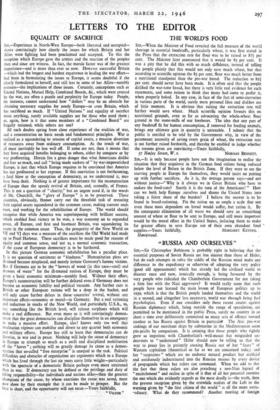LETTERS TO THE EDITOR
EQUALITY OF SACRIFICE
SIR,—Experience in North-West Europe—both liberated and occupied— shows convincingly how clearly the issues for which Britain and her
Allies were fighting had been proclaimed and accepted. To this the reception which Europe gave the armies and the reaction of the peoples then and since are witness. In fact, the morale factor was of the greatest
importance—and is more than ever so now. However successful Britain —which had the longest and hardest experience in leading the war effort—
had been in formulating the issues to Europe, it seems doubtful if she clearly formulated to herself, and still less to some of her Allies—notably overseas—the implications of those issues. Certainly, conceptions such as United Nations, Mutual Help, Combined Boards, &c., which were created by the war, are often a puzzle and perplexity for Europe today. People, for instance, cannot understand how " dollars " may be an obstacle for c.btaining necessary supplies for needy Europe—or even Britain, which has sacrificed so much. If "United Nations " and equality of sacrifice mean anything, surely available supplies are for those who need them ; or, again, how is it that some members of a " Combined Board" are frugally rationed, while others are not?
All such doubts spring from close experience of the realities of war, and a concentration on basic needs and fundamental principles. War is realised as a squandering or erosion of capital assets, a massive diversion of resources away from ordinary consumption. As the result of war, all must inevitably be less well off. If some are not, then it means that
they have acquired benefits belonging to others, either by conquest or by war profiteering. Herein lies a great danger that what Americans dislike and fear so much, and call "being made suckers of " by war-impoverished
Europe, is just that which Europe requires to be convinced that America
has not profiteered at her expense. If this conviction is not forthcoming, a fatal blow at the conception of democracy, as we understand it, may have been dealt. Nothing is of greater importance for the reconstruction of Europe than the speedy revival of Britain, and, secondly, of France. This is not a question of " charity," but an urgent need if, in the words of Mr. Churchill, the " glory of Europe " is to be preserved. These
countries, obviously, cannot carry out the threefold task of restoring heir capital assets squandered in the common cause, making current ends meet, and working for the rehabilitation of Europe. The world should
recognise that while America was superimposing with brilliant success, which enabled final victory to be won, a war economy on to expanded
peace, all Europe, and first and foremost Britain, was squandering its assets in the common cause. Thus, the prosperity of the New World on \'E and VJ days was a measure of the sacrifices the Old World had made up to Pearl Harbour. These sacrifices must be made good for reasons of equity and common sense, and not as, a normal economic transaction, if the cause of European democracy is to be furthered.
In this picture German economic rehabilitation has a peculiar place. It is no question of sentiment or " kindness." Humanitarian pleas are ill-timed because misplaced, and merely irritate Germany's former victims.
But if Germans are to be the "hewers of wood (in this case—coal) and drawers of water " for the ill-treated natives of Europe, they must be
given a basic economic minimum—notably food. Without their effort, Europe's reconstruction will be further delayed even if Germany does not become an economic liability and political vacuum. Any further cuts in British or other European rations will be a drop in the bucket, and will only cause further delays in those countries' revival, without any important effect—economic or moral—in Germany. But a real rationing
and reduction in stocks of the New World, and particularly. U.S.A., to, say, something like the British level, will release surpluses which will make a real difference. But even more so it will convincingly demon-
strate that the great democracies can discipline themselves in an emergency
to make a massive effort. Europe, alas! knows only too well that totalitarian regimes can mobilise and divert to any quarter both economic and military efforts. Europe has still to learn that democracies can do likewise, in war and in peace. Nothing will help the cause of democracy in Europe to triumph so much as a swift and disciplined mobilisation of the "haves " ; nothing will so greatly damage its cause as a demon- stration that so-called "free enterprise" is unequal to the task. Political difficulties and obstacles of organisation are arguments which to a Europe which has lived through the last six years carry little weight—particularly with the spectacle of a democratic Britain perhaps even more straitened than in war. If democracy can be defined as the privilege and duty of taking responsibility—for individuals and nations alike—then the greatest champions of the cause, by whose exertions the cause was saved, must now show by their example that it can be made to prosper. But the time is short, and the opportunity will not recur.—Yours faithfully,






























 Previous page
Previous page